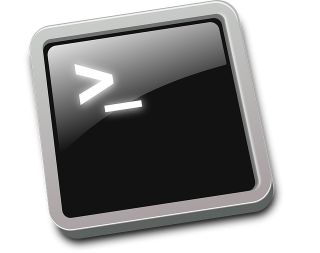To install the remaining CLI software, download the installation script install-additional-cli-software.sh, open your terminal, and execute it: bash install-cli-software.sh.
1. ESSENTIAL COMMANDS
- Navigation:
pwd,ls,cd folder(folders are case sensitive!),cd ... - File manipulation:
cat,cp,ln,mkdir,mv,rm,rmdir,touch. - Help:
man terminal_command. - Permissions:
chgrp,chmod,chown,su,sudo. - Search:
find. - Text editors:
ed,nano,vi,vim. - Text file visualization:
head,less,more,tail. - Install a package:
sudo apt-get install package. - Uninstall a package:
sudo apt-get purge package. - Remove packages that are no longer needed:
sudo apt-get autoremove.
2. BASH SHORTCUTS
- Autocomplete files, folders, commands, packages, etc.:
Tab. - List all available files, folders, commands, packages, etc.:
Tab+Tab. - Go to previous command:
↑, orCtrl+P. - Go to next command:
↓, orCtrl+N. - Search through previously used commands:
Ctrl+R. - Interrupt whatever you are running:
Ctrl+C.
2. BASIC COMMANDS
- Compare files line by line:
colordiff,diff,vimdiff,wdiff. - List files in databases that match a pattern:
locate,sudo updatedb. - Network interface:
ifconfig. - Report disk space usage:
df -H,du -hs folder. - OpenSSH SSH client with X11 forwarding:
ssh user@server -X. - Print lines matching a pattern from a text file:
grep. - Print newline, word, and byte counts for each file:
wc. - Secure copy (remote file copy program):
scp. - Show current processes:
htop,ps,top.
3. SCREEN COMMANDS
- Create a screen session:
screen. - Detach from the current screen session:
Ctrl+AthenD. - List the screen session identification strings:
screen -ls. - Reattach to a screen session:
screen -r session_id_string. - Terminate the current screen session:
exit, orCtrl+Athen:quit. - Scroll up/down during session:
Ctrl+AthenEscthen↑/↓/PgUp/PgDn.
4. OTHER COMMANDS
- Extract an ISO file:
7z x filename.iso. - Report faked system time to programs:
faketime. - Retrieves files from the web:
wget. - Print shared library dependencies:
ldd executable_filename. - Make symbolic links:
ln -s input_filename output_link_name. - List block devices:
lsblk. - Format USB stick as VFAT:
sudo mkfs.vfat -I /dev/sdx -n NAME && sync. - Restore disk from image:
sudo dd bs=1M if=im.iso of=/dev/sdx && sync.
5. FFMPEG COMMANDS
- Convert image to 5 sec. video:
ffmpeg -loop 1 -i 01.png -t 5 out.mp4. - 15 images to 30 Hz 5 sec. video:
ffmpeg -r 3 -i %03d.png -r 30 out.mp4. - Resize video to 720p:
ffmpeg -i input.webm -s 1280x720 output.webm. - Fade in the first 25 frames and fade out the last 25 frames of a 1000-frame video:
ffmpeg -i in.mp4 -vf "fade=in:0:25, fade=out:975:25" out.mp4. - Concatenate videos:
ffmpeg -f concat -i mylist.txt -c copy out.mp4.
6. SVN COMMANDS
- Create new repository:
svnadmin create repository_name. - Checkout:
svn co svn+ssh://user@server/path/to/repository. - Update working copy:
svn update. - Get status of current copy:
svn status. - Add all items recursively:
svn add *. - Add an item (if folder, adds recursively):
svn add item_name. - Delete an item (if folder, deletes recursively):
svn delete item_name. - Commit with log message:
svn commit -m 'message'.
7. FIND EXAMPLES
- Run files recursively in current dir.:
find . -type f -exec file '{}' \;. - Delete all .svn folders:
find . -iname .svn -prune -exec rm -r '{}' \;. - Copy all png files to png:
find ./ -name *.png -exec cp '{}' ./png \;.
8. PDFTK EXAMPLES
- Join all PDF files into a new PDF file:
pdftk *.pdf cat output out.pdf. - Join 3 PDF files:
pdftk in1.pdf in2.pdf in3.pdf cat output out.pdf. - Extract pages from a PDF:
pdftk in.pdf cat 1 25-35 end output out.pdf.
http://milq.github.io/useful-terminal-commands-ubuntu-debian
Manuel Ignacio López Quintero
